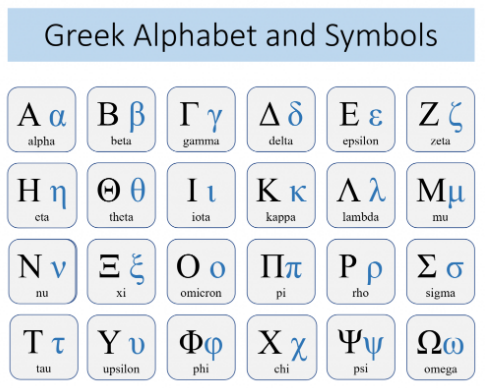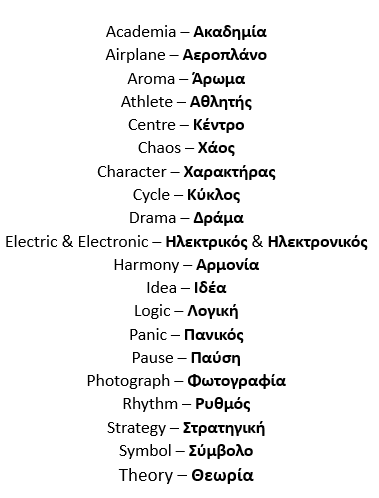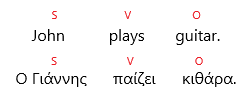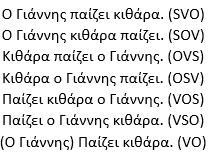
Will you be traveling to Greece and would like to be able to order your coffee in Greek? Will you be moving to Greece for work, and you just need to know enough to get by in everyday life? Do you want to impress your Greek yiayia by engaging in a conversation with her for more than 30 seconds? And all that, while finding Greek hard to learn?
Regardless of why you want to learn Greek, there is a common conception that might discourage you – that Greek is almost impossible to learn. In this article, I will investigate this (mis)conception, while explaining the “easiest” and “hardest” aspects of the language for anyone interested in learning ellinika.
It’s All Greek to Me
A common English idiomatic expression that means someone does not understand what is being said (fun fact: the Greek equivalent is “It’s all Chinese to me”).
Well, that expression is not far from the truth. Greek is classified as a category III language, which means it differs significantly from English. That is, while no language is inherently “difficult,” English speakers may find Greek hard to learn.
And here’s my personal experience: as a native Greek, I have been studying English since I was 9 years old. It wasn’t until my early adulthood that I felt confident in my language skills. On the other hand, having studied Latin, when I was learning French, I found it much easier to grasp and remember the language’s specifics. And when I first started learning Spanish, well, I was in for a treat, as I couldn’t even believe how easy I found it to remember both vocabulary and grammar.
What I mean is that, depending on your native language, background, and desire to learn languages, you may find Greek hard to learn or learn Greek quite fast. That said, you shouldn’t be deterred from learning the language; it can be a very enjoyable and rewarding experience. Let’s look at what makes Greek hard to learn and what makes it easy.
Why Is Greek Easy to Learn
First, we’ll discuss what makes Greek an easy language to learn. Or, at the very least, some common points that might help you feel less intimidated when you begin learning Greek.
Greek Alphabet
While Greek has different letters than English and the other languages that use the Latin alphabet, there are many similarities. If you look closely at the Greek alphabet, you will recognize more than half of the letters, particularly the capitals. Also, if you’ve studied math or physics before, you’ll recognize some more.

The Latin alphabet was derived from the Ancient Greek alphabet, which explains why they share several letters. Back then, they had similar pronunciations. Unfortunately, as language and pronunciation changed over the last two millennia, Modern Greek became more difficult to learn for English speakers.
Loan Words and Origins
Even though Greek is neither a Germanic nor a Romance language, it’s much closer to the latter. This puts a Spanish speaker, for example, in a better position than an English speaker when learning Greek. However, over the centuries, languages have interacted with and influenced one another.
Many Greek words will be familiar to you, practically because you already know them! English has been heavily influenced by Greek over the centuries. Well, most technical and medical terms are Greek, but I doubt you will need to say “ophthalmologist” frequently. And, aside from democracy, astronomy, philosophy, and the other obvious ones, you can find a lot more words than you can imagine. Let’s look at some common words that come from Greek and are very similar in Greek, aside from a few pronunciation differences:

Another cool trick is that most words beginning with “ph-” and many words beginning with “th-” are of Greek origin, and you can recognize them when you hear them spoken in Greek.
Similar Types of Words
Greek pronunciation can be tricky. Greek grammar and syntax can be trickier. However, the fundamentals of the language’s grammar are not that different from English.
Everything you will learn in Greek falls into the following categories:
- Verb
- Noun
- Adjective
- Adverb
- Preposition
- Pronoun
- Conjunction/Interjection
The vocabulary may differ, but you will be able to immediately understand the role of each word in a sentence.
Similar Sentence Structure
Even though Greek has a more flexible syntax, as we will see below, its main sentence structure is similar to English. And that is SVO (Subject-Verb-Object). For example:

Beginning with that point, all other parts of speech can be added to sentences in both languages in the same manner.
Countless Resources
Of course, the similarities between a language and our native language are not the only factors that contribute to its ease of learning. We discovered that English speakers may find Greek hard to learn, at least harder than, let’s say, Romanian speakers. However, there is one more important factor that outweighs everything else: access to resources.
At the end of the day, if you are willing to put in the time and the effort, Greek is not a hard language to learn. But that also depends on the large number of resources available on the internet. From podcasts to textbooks, and from gamified exercises to apps created for language learning, there is a wide variety of choice. That means that, even if you cannot afford a tutor at the moment, there is still a wide variety of material to choose from and create your own self-learning program.
Why Is Greek Hard to Learn
I’ll keep that list short, even though there are numerous reasons why someone would consider Greek hard to learn. Let’s go over the most prominent characteristics that may make Greek hard to learn.
Pronunciation
Mastering pronunciation is one of the most difficult aspects of learning a new language, especially if it differs significantly from your native language. This is also the case with Greek and English.
Many sounds exist in Greek but not in English, and vice versa. First and foremost, Greek has only five vowels, and they are all “open”: /a/, /e/, /o/, /i/, /u/. Since English is a language with many more vowels, we sometimes fall back on our native phonetic patterns rather than learning what the target language does.
Example: in the word ώρα (/’ora/), meaning time, a native English speaker will be tempted to pronounce the “o” as in open, whereas the correct pronunciation is something like the “o” in body in British pronunciation.
Other sounds that can be difficult to pronounce include γ, δ, θ, and χ. They are as follows:
| γ | /γ/ (no similarity) or /j/ as the “y” in yes |
| δ | /δ/ as “th” in breathe |
| θ | /θ/ as “th” in path |
| χ | /x/ (no similarity) |
A good way to learn these letters is to practice constantly, study the Greek IPA with sounds or watch YouTube videos that explain how these sounds are pronounced. You can also read this very useful article in Modern Greek phonology.
Spelling and Orthography
Greek spelling and pronunciation can be tricky at times. Though all letters are pronounced – looking at you, French – sometimes what you see may not always match what you expect to hear. For example, if you come across the letters “αι”, you would expect them to read as /ai/ (“aee”). However, they are pronounced /e/. Also, [ι, η, υ, οι, ει] are all pronounced /i/ (“ee”, as in beet).
Why is that, though? Modern Greek has what linguists refer to as a historical spelling rather than a phonetic one. Because most words in Modern Greek are derived almost entirely from Ancient Greek, they retain the same spelling even though the pronunciation is simplified. So, the five ways to say “ee” described above had distinct pronunciations 2000 years ago.
Despite the fact that they are all pronounced the same nowadays, historical spelling is preserved, not only for cultural reasons but also because distinguishing homophones can be semantically important.
Some common homophones in Greek are:
| κλίμα (climate) | κλήμα (grapevine) |
| σήκω (get up) | σύκο (fig) |
| ώμος (shoulder) | όμως (though) |
| μίλα (speak) | μήλα (apples) |
| λύπη (sadness) | λείπει (it’s missing) |
| πείρα (experience) | πήρα (I took) |
| πάλι (again) | πάλη (wrestling) |
| τύχη (luck) | τοίχοι (walls) |
| χοίρος (pig) | χήρος (widow) |
And if that isn’t enough, here’s the pinnacle of Greek homophones:
- Φύλλο (leaf)
- Φύλο (gender)
- Φίλο (friend)
And don’t get me started on near homophones, which also depend on where the accent falls. That makes learning Greek spelling and pronunciation extremely important; otherwise, you may be in for quite a few misunderstandings. Unfortunately, aside from a few lists of common homophones, there is no real rule for this. That makes them a bit tricky to learn.
Intricate Conjugation
Greek grammar, unlike English, has a much more complex conjugation system. Conjugation depicts all possible modifications to a verb and describes changes based on person, tense, number, voice, and mood.
For instance, even in the Present Tense, we can see that Greek has significantly more suffixes than English:
| To Play (Present Tense) | Παίζω (Present Tense) | ||
| I | play | Εγώ | παίζ-ω |
| You | play | Εσύ | παίζ-εις |
| He/She/It | play-s | Αυτός-ή-ό | παίζ-ει |
| We | play | Εμείς | παίζ-ουμε |
| You | play | Εσείς | παίζ-ετε |
| They | play | Αυτοί-ές-ά | παίζ-ουν |
You can read more on Greek’s intricate conjugation here. However, I must say that, if you master the fundamentals and understand how verbs vary depending on the subjects, shortly you will be able to learn the rules more quickly. Simply expose yourself to both spoken and written Greek, and it will be much easier.
Gender Agreement
The thing is, while English and Greek share nouns and adjectives, Greek has another fascinating characteristic: gender agreement!
Let’s start by stating that nouns, adjectives, and pronouns are all inflected. That means that each of these words has a different suffix depending on gender, person, number, and tense! You can check out this video for a detailed analysis of how these words are declined.
However, declining words are not the reason one would find Greek hard to learn. It is the fact that nouns are also gendered, and there is no rule that governs how the grammatical gender is chosen.
For instance, see the nouns below:
- η καρέκλα 🡪 the chair (fem.)
- το τραπέζι 🡪 the table (neutral)
- ο καναπές 🡪 the sofa (masc.)
The noun’s inherent grammatical gender influences the articles, their declension, and any pronouns or adjectives that may be used. This may be the most difficult aspect of Greek grammar because there are no rules governing how and why these nouns are gendered; you must simply learn them as they are, just as you would in French.
“Free” Syntax
Finally, while Greek follows the same SVO order as English, things are not as rigid. In Greek, you can change the word order and even omit the subject if it is easily inferred through context, and it will still make sense. Let’s look at the sentence we saw above, “Ο Γιάννης παίζει κιθάρα” (John plays the guitar). This sentence can be said in the following ways while still being grammatically correct:

On the one hand, the freedom of word order makes it easier to get away with any potential errors. However, when more words are added to a sentence or when trying to understand fast, spoken Greek, this characteristic may become confusing.
Is Greek Hard to Learn – Final Thoughts
To be honest, Greek is a difficult language for English speakers. There are numerous differences, ranging from the alphabet to how sentences are structured. Even if you begin learning right away, the time it takes to learn Greek can vary greatly. However, not only is it not an impossible task, but it is quite rewarding as well.
As with any other languages, stay focused, practice every day, or take lessons with a Greek tutor if necessary. In no time, you will be able to say «Καλημέρα! » and hold a conversation with anyone.
And don’t forget to practice with Clozemaster, the language-learning app that will get you to the upper intermediate level in Greek in a fun, gamified way!
Clozemaster has been designed to help you learn the language in context by filling in the gaps in authentic sentences. With features such as Grammar Challenges, Cloze-Listening, and Cloze-Reading, the app will let you emphasize all the competencies necessary to become fluent in Greek.
Take your Greek to the next level. Click here to start practicing with real Greek sente

